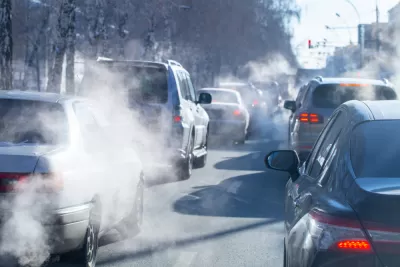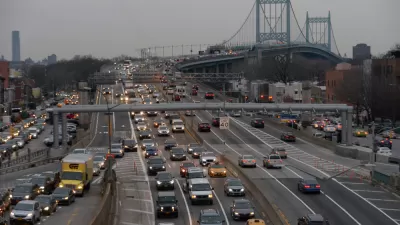A Biden-era regulation required states to report and plan to reduce transportation-related emissions.

The U.S Department of Transportation (USDOT) announced its repeal of a rule that required states to “monitor and report transportation-related emissions on interstate highways and other major roads.” The rule also required states to create two- and four-year greenhouse gas emissions reduction targets.
An announcement from the Federal Highway Administration (FHA) subtitles the announcement “Prevents Radical Environmental Agenda from Tying up Road Construction.” According to Smart Cities Dive’s Dan Zukowski, the rule had been the target of criticism from conservative lawmakers and many transportation industry leaders and officials such as U.S. Transportation Secretary Sean Duffy, who called it a “ridiculous climate requirement.”
Meanwhile, “Steven Higashide, clean transportation program director at the Union of Concerned Scientists, said in an email that it is ‘deeply disappointing to see the US DOT go along with vested interests in the road-building industry.’”
FULL STORY: DOT repeals highway GHG emissions reporting rule

Maui's Vacation Rental Debate Turns Ugly
Verbal attacks, misinformation campaigns and fistfights plague a high-stakes debate to convert thousands of vacation rentals into long-term housing.

Planetizen Federal Action Tracker
A weekly monitor of how Trump’s orders and actions are impacting planners and planning in America.

In Urban Planning, AI Prompting Could be the New Design Thinking
Creativity has long been key to great urban design. What if we see AI as our new creative partner?

Portland Raises Parking Fees to Pay for Street Maintenance
The city is struggling to bridge a massive budget gap at the Bureau of Transportation, which largely depleted its reserves during the Civd-19 pandemic.

Spokane Mayor Introduces Housing Reforms Package
Mayor Lisa Brown’s proposals include deferring or waiving some development fees to encourage more affordable housing development.

Houston Mayor Kills Another Bike Lane
The mayor rejected a proposed bike lane in the Montrose district in keeping with his pledge to maintain car lanes.
Urban Design for Planners 1: Software Tools
This six-course series explores essential urban design concepts using open source software and equips planners with the tools they need to participate fully in the urban design process.
Planning for Universal Design
Learn the tools for implementing Universal Design in planning regulations.
Gallatin County Department of Planning & Community Development
Heyer Gruel & Associates PA
JM Goldson LLC
City of Camden Redevelopment Agency
City of Astoria
Transportation Research & Education Center (TREC) at Portland State University
Jefferson Parish Government
Camden Redevelopment Agency
City of Claremont





























